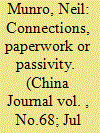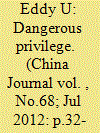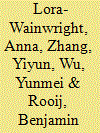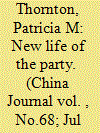|
|
|
Sort Order |
|
|
|
Items / Page
|
|
|
|
|
|
|
| Srl | Item |
| 1 |
ID:
113933


|
|
|
|
|
| Publication |
2012.
|
| Summary/Abstract |
The low degree of institutionalization of Chinese administration means that citizens engaging with the bureaucracy have a choice of strategies to achieve objectives. This article deploys Asia Barometer survey data from 2006 to construct a predictive model of preferences to obtain a government permit, including use of connections (guanxi), bribery, writing letters, waiting patiently, and the passive-pessimistic response "nothing can be done". It finds that strategy preference varies according to location (urban or rural interacting with region), socio-economic status, social capital, political values and political performance evaluations. The pattern of determinants shows that Chinese citizens are cross-pressured. The class and gender nature of guanxi and bribery are an obstacle to the creation of a modern Chinese state, but high levels of social trust, support for political freedom, the market and meritocracy combined with the reservoir of trust enjoyed by executive organs present a favourable climate for efforts to improve governance.
|
|
|
|
|
|
|
|
|
|
|
|
|
|
|
|
| 2 |
ID:
113934


|
|
|
|
|
| Publication |
2012.
|
| Summary/Abstract |
In April 2009, the Chinese government unveiled a plan for a comprehensive overhaul of the country's medical system. This dramatic moment was preceded by public debate, as well as government introduction of forums for public participation, which allowed diverse social groups to provide feedback on the policymaking process. Tracing the origins and outcome of the debate and public participation, we ask whether this debate and participation go beyond consultation and could be regarded as deliberation. Finally, we attempt to evaluate whether this process could precipitate a democratic transition. We contend that the government introduced participatory forums for the purpose of conducting consultation, yet the design of the arenas for consultation created some space for limited deliberation. We conclude that this process is not likely to produce a democratic transition, but argue that it may contribute to better governance, as consultation may generate popular expectations for inclusion and responsiveness.
|
|
|
|
|
|
|
|
|
|
|
|
|
|
|
|
| 3 |
ID:
113928


|
|
|
|
|
| Publication |
2012.
|
| Summary/Abstract |
Why did otherwise savvy or cautious intellectuals put themselves at risk by attacking the dictatorial Chinese Communist state during the Rectification Campaign of 1957? This essay highlights the critical impact of the postrevolution institution of the united front. A primary tool for acquiring support of non-Party personnel, the official institution featured at the élite level a bundle of exclusive privilege and cultivated exemplary cooperation as well as sentiments of trust, confidence and even admiration toward the regime. Determined to conduct a successful rectification campaign, the regime targeted the élites as usual for support but with augmented privilege. The particular yet familiar approach greatly affected the psychology and calculus of the élites, prompting some to cooperate in criticizing the state. Their publicized opinions set off the dissent of intellectuals and resulted in their own decline. The analysis furthers understanding of the united front and state-society relations in the early Mao years.
|
|
|
|
|
|
|
|
|
|
|
|
|
|
|
|
| 4 |
ID:
113927


|
|
|
|
|
| Publication |
2012.
|
| Summary/Abstract |
Jiangsu was one of the many Chinese provinces that suffered from bitter and prolonged factional violence in 1967 and 1968. It took more than three years to recreate relatively stable government authority, and the process was protracted and highly contentious. A provisional cease-fire orchestrated by Beijing in September 1967 initiated six months of chaotic negotiations in Beijing, in which opposed civilian and military delegations proved immune to the Center's efforts to forge factional unity. The divisions continued to fester after the controversial General Xu Shiyou was put in charge of a new Provincial Revolutionary Committee in March 1968 that gave leading civilian rebels from neither faction significant posts. It took General Xu almost three years to eliminate his civilian and military opponents but, by the end of 1970, after a series of fierce suppression campaigns, he and his military allies ruled Jiangsu with an iron hand.
|
|
|
|
|
|
|
|
|
|
|
|
|
|
|
|
| 5 |
ID:
113931


|
|
|
|
|
| Publication |
2012.
|
| Summary/Abstract |
It is often assumed that, when citizens do not oppose pollution, it is due to their ignorance of its effects or to structural barriers to change. This article argues that a sense that pollution is inevitable is also a major obstacle. We outline the gradual formation of environmental subjects who have learnt to value their environment in ways consonant with the seemingly inevitable presence of pollution. We argue that perceptions of inevitability were produced by: (1) the subordination of villagers to their leaders and the dependence of both on local industries; (2) experiences with protests; and (3) the framing of the exploitation of local resources as part of a broader national project of development. This study sheds light on the study of environmental protests in China by illustrating how parameters for contention come into being and how they are intertwined with the governance of the village and of the environment.
|
|
|
|
|
|
|
|
|
|
|
|
|
|
|
|
| 6 |
ID:
113932


|
|
|
|
|
| Publication |
2012.
|
| Summary/Abstract |
Over the past decade, a number of foreign grantmakers and international NGOs have funded, initiated and/or designed training programs that introduce their Chinese grantees to "best practices" in "NGO management". Drawing on several years of fieldwork, this article sheds light on the origins and lessons conveyed by two such "capacity-building" programs. Rather than being grounded in the actual, lived experience of Chinese civil society organizations and emerging organically from the bottom up, these programs are shown to reflect more accurately the concerns of foreign donors and the professionalized segment of the North American nonprofit world. The article concludes by suggesting that, despite recurring Chinese suspicions of civil society as a new weapon of foreign imperialism, the structures and practices promoted by donors mesh well with state efforts to channel new social energies into predictable and governable organizational forms.
|
|
|
|
|
|
|
|
|
|
|
|
|
|
|
|
| 7 |
ID:
113929


|
|
|
|
|
| Publication |
2012.
|
| Summary/Abstract |
While the 2004 introduction of a Party-organized trade union in Wal-Mart's mainland China-based stores was widely reported, far less is known about official Party branches and committees in the non-state-owned sector. Well over 3.5 million Party members now work in "non-publicly owned enterprises", a sector of the economy in which the Party has continued to expand. The Party is experimenting with new organizational arrangements and remaking its social agenda in order to increase its popularity, relevance and appeal, particularly among young urban professionals. This article outlines recent Party-building initiatives in the private sector over the last decade. Drawing upon membership and other data from over 1,000 local Party committees in non-publicly owned enterprises in greater Shanghai, I analyze contemporary "Party life" in "two new" branches-new social and new economic organizations since the adoption of market reform-as a reflection of the Party's possible future as it absorbs the "advanced forces" of an increasingly market-oriented China.
|
|
|
|
|
|
|
|
|
|
|
|
|
|
|
|
| 8 |
ID:
113930


|
|
|
|
|
| Publication |
2012.
|
| Summary/Abstract |
Most analyses of central government policy in Xinjiang focus on "the Uyghur problem". This article demonstrates the coexistence of a significant "Han problem" in Xinjiang, and thereby throws a different light on relations between center and periphery in China. Central government reactions to the Ürümqi riots in July 2009 suggest that stability among the Han population of Xinjiang is the center's primary objective, and that this stability is seen to be facilitated by a particular style of development. Furthermore, state-society interactions in the immediate aftermath of the 2009 riots show that Han in Xinjiang perceive themselves to possess collective-if limited and contingent-influence. This perception is the product of the mass frame through which, I argue, the Han mainstream view their relationship with the central government. I call this mass frame "the partnership of stability".
|
|
|
|
|
|
|
|
|
|
|
|
|
|
|
|
|
|
|
|
|